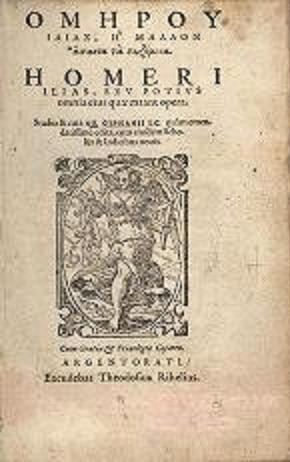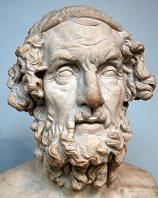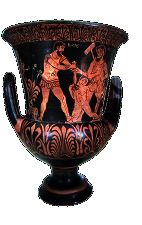GED105 - Greek Mythology
Module 1: Myths & Mythology
Introduction
What is Mythology?
Mythology refers to a collection of myths or the study of mythology. The Cambridge Dictionary defines myth as "an ancient story or set of stories...". Myths are simply stories - fantastic tales of powerful gods and goddesses, frightening creatures and brave heroes set in ancient places. Were these amazing stories true? That's for you to decide! It is hard to know how and where most of these myths came from, and in fact, it is quite common to hear or read many different versions of the same myth. That is part of the charm and appeal of mythology.
We do know that every ancient civilization had its own unique set of myths - its own mythology. Interestingly, no matter where the myths originated - Greece, India or Egypt, for example - many of these myths had similar themes and served similar purposes. For example, nearly every culture has a version of a creation myth, a story or stories that explain the beginning of the universe. In addition, many myths are much the same across different places and cultures. For example, many Roman myths are nearly identical to the Greek versions and, in some cases, only the names of the characters and places are different. In this course, we will study the myths of the ancient Greeks.
Module Outcomes
1.0 Describe mythological stories as a form of artistic expression and discuss the purpose and role of these stories
1.1 Define myth and mythology
1.2 List the common elements and characteristics of a myth
1.3 Describe the purpose and role of myths in classical Greek society
1.4 List sources of mythological stories
Lesson 1: Myths & Mythology
Lesson Notes
The focus of this lesson is on the following topics:
- Why Did the Ancient Greeks Create Myths?
- Evidence of Myth
- The Study of Myth
- Myths & Mythology
Why Did the Ancient Greeks Create Myths?
We might not know when these stories originated or who created them but we do know that myths served several purposes in classical Greek society.
For the Greeks, the myths helped to explain the world around them and the things they could not understand. Thousands of years ago, the knowledge and experience we have today were simply not available. People had not yet discovered the science that explained why the seasons changed or the arrangement of stars in the sky so they invented stories that did. Likewise, creation myths told the Greeks where they came from and explained to them how the world began. You will have the chance to read two popular creation myths in Lesson 2 of this course.
Other myths offered moral lessons and provided guidelines for living in society. Myths warned the Greeks about the dangers and outcomes of bad behaviour and described the rewards for acting responsibly and making wise decisions. In Lesson 3 you will read a story about a nymph and the bad habit that cost her true love. Later, in Lesson 5, you will read about Midas and learn why you should indeed "be careful what you wish for."
Myths told tales of heroism and bravery that helped to develop the culture and history of Greece. The heroes and legends of Greek mythology continue to influence society today. Recently, several movies have used these stories for inspiration including 300 (2007) and Troy (2004). Add to this list some older films such as Clash of the Titans (1981) and the remake in 2010, and Helen of Troy (1956).
As mythology did for other cultures and civilizations, the myths of ancient Greece likely served as a form of religion for the people of the time. Undoubtedly, there were those who believed them absolutely and others who probably thought they were mere fantasy. For us, these myths are unique artistic representations that provide a look back to an ancient time and place.
If the myths are from ancient times, how do we know about them anyway?
How Do We Know About Myths?
Although we cannot say definitely when these myths originated, it is generally accepted that they were in existence between 1200 and 1000 B.C.E. - that's 3000 years ago! These myths evolved over time. The people of ancient Greece did not read or write, so originally the myths were passed down orally from person to person, generation to generation, through the centuries.
Much later, around the 8th or 7th century B.C.E., writing arrived in Greece. The ancient poets Hesiod and Homer began to describe these stories in epics such as The Odyssey, The Iliad and Theogony. Much of what we know about Greek mythology comes from these writers.
There is other archeological evidence for myth. In addition to literature, myths have been represented in other forms of art as well. The characters, symbols and places of the myths have been depicted on vases, sculptures, paintings and in architecture over hundreds of years.
There are several reasons why there are so many different versions of the same myth. The lack of an original written record, the length of time since they originated and the sheer number of myths throughout the cultures and regions of the world are all reasons why no single version of a myth is considered completely accurate. Unfortunately, humans do not possess the original text of any single myth. However, we do have myths as written down by particular people in place and time. As you can imagine, an author’s “context” – that is, time and place in history – is crucial to truly understand mythology .
 |
Title Page of Homer's The Iliad This image is from Wikipedia Commons |
|
Bust of the poet Homer Artist Unknown This image from Wikipedia Commons |
This image from Wikipedia Commons |
Vase with Achilles killing a prisoner From 4th-3rd BCE |
Please note that the myths presented in this course are the instructor's own
interpretation of popular Greek myths.
Why Study Mythology?
So what? Who cares? It doesn’t matter any longer! It’s history! These might be some of your reactions to Greek mythology. However, these myths and the ancient Greeks themselves have influenced - and continue to influence - virtually every area of Western society. In seeking to understand where we came from, and perhaps where we are going, as a “society”, it is worthwhile to learn more about the people, places, and stories of mythology upon which our lives are built. Here are a few examples of the influence of Greek mythology in “society”:
|
English Language and Literature Have you ever wondered where the terms Pandora's Box or Achilles Heel come from? Did you know that words such as atlas and nemesis can be traced back to these stories? Even the word alphabet comes from the Greek letters alpha and beta. |
Click here to see your name in Greek letters |
|
|
|
Business and Industry Major international corporations and businesses frequently use the symbols and names from mythology. You have probably heard of Ajax, Nike and Midas Muffler but did you know that FTD's symbol is a man wearing a winged sandal just like Hermes? How about the image of a siren on Starbucks cups? The Volkswagon Phaeton? Trojan condoms? |
Click here to see Chrysler's concept car the Chronos |
|
|
Science Constellations, medical terms, architecture and geographical place names all show evidence of the ancient Greeks. The Hippocratic oath that doctors abide by is credited to the Greek Hippocrates. Orion and many other constellations got their names from the characters of mythology. You’ll also recognize the universal symbol of medicine – Caduceus – of two snakes around a staff with two wings. |
Click here to visit NASA's page about the Apollo space program |
|
|
Arts and Entertainment You will see beautiful images and paintings of the Greeks throughout this course, but mythology influences much more. If you look closely, you will discover the Greek influence in comic books, music and even video games. |
Click here to listen to the 1607 Monteverdi opera Orfeo based on the story of Orpheus |
Summary
In this module, you have learned what mythology is. Mythology refers to a collection of myths or the study of mythology. Every ancient civilization had its own unique mythology. For the Greeks, mythology helped explain the world around them. Mythology is also a reflection of Greek culture of the time. We do not possess the original stories of Greek Mythology, however, we do have versions that were written down by various people in time. We know that Greek Mythology, and other mythology for that matter, has influenced aspects of our 21st Century life through literature, the arts, business and industry, the sciences, and other entertainment.
Concepts to Consider
What was the purpose and role of myths in classical Greek society?


